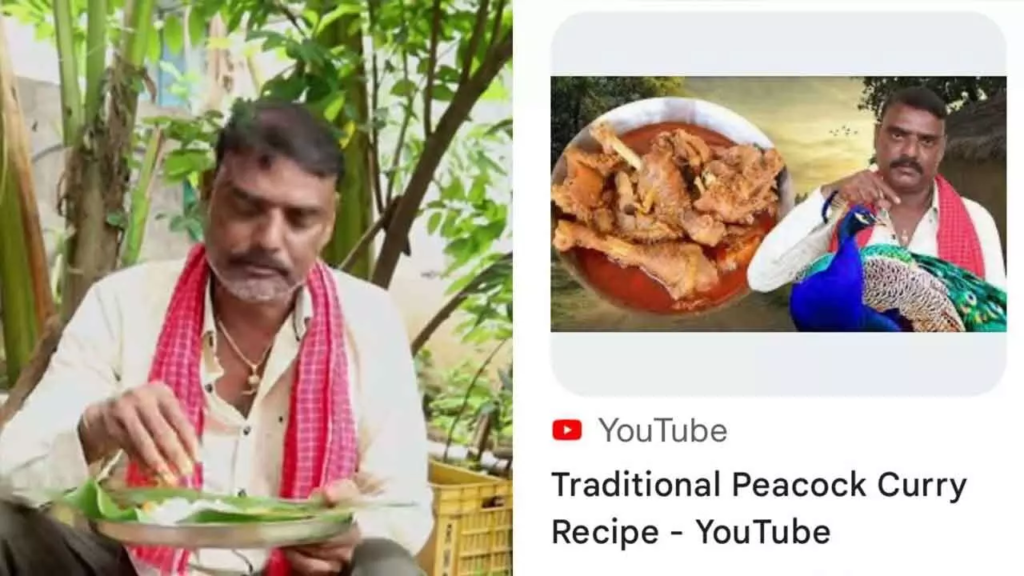In early August 2024, a seemingly innocuous YouTube video from Telangana ignited a massive peacock curry controversy, culminating in the arrest of its creator and sparking a national debate on wildlife conservation, cultural practices, and digital responsibility. This article delves into the entire sequence of events, the reactions from various stakeholders, and the broader implications of this incident.

The Genesis of the Peacock Curry Controversy
On August 8, 2024, Ravi Kumar, a YouTuber renowned for his culinary content, posted a video titled “Traditional Peacock Curry Recipe” on his channel. In the video, Kumar prepared a dish using a peacock, an act that is illegal under Indian wildlife protection laws. The video quickly gained traction, amassing millions of views within hours. Kumar’s intent was to showcase a traditional recipe he claimed was a part of his family’s heritage.
The video showed the entire process—from hunting the peacock to cooking the curry. This depiction was not only shocking to many viewers but also in blatant disregard of the Wildlife Protection Act of 1972, which prohibits the hunting, capture, and consumption of peacocks.
Timeline of Key Events
- August 8, 2024: Ravi Kumar uploads the controversial video on YouTube. The video rapidly goes viral, sparking widespread outrage.
- August 10, 2024: Environmental organizations and wildlife enthusiasts begin filing complaints. The Telangana Forest Department starts investigating the claims.
- August 12, 2024: Kumar is arrested by Telangana police on charges of violating the Wildlife Protection Act. The video is promptly removed from YouTube.
- August 15, 2024: The Telangana Forest Department issues a statement condemning the video and reinforcing the importance of adhering to wildlife conservation laws.
- August 20, 2024: The incident garners extensive media coverage. Public discourse shifts towards examining the balance between cultural practices and legal norms in the digital age.
Reactions from Authorities and Experts
The legal ramifications were swift and severe. The Telangana police arrested Ravi Kumar on August 12, citing violations of Section 9 and 39 of the Wildlife Protection Act. This Act mandates strict penalties for offenses related to the hunting and consumption of protected species. Kumar’s arrest was seen as a necessary step to uphold the law and deter similar violations.
Dr. Anil Sharma, a prominent wildlife conservationist, criticized Kumar’s actions, stating, “The hunting of protected species like peacocks is not only illegal but also detrimental to our biodiversity. This incident underscores the urgent need for more stringent monitoring of content that may promote illegal activities.”
Public reaction was equally intense. Many viewed the video as a reckless exploitation of traditional culinary practices for sensationalism. Priya Reddy, a cultural commentator, argued, “While preserving traditional recipes is valuable, it should not come at the cost of violating laws designed to protect our wildlife. Content creators must be mindful of the broader impact of their work.”
Cultural and Ethical Considerations
The controversy raised important questions about the intersection of tradition and modernity. Kumar defended his video by asserting that he was honoring his family’s culinary heritage. However, critics argued that traditional practices must evolve to comply with current legal and ethical standards.
The debate intensified as people questioned whether cultural preservation justifies breaking laws designed to protect endangered species. The incident highlighted a growing concern over how digital platforms can sometimes promote content that conflicts with legal and ethical norms.
Conclusion: The Broader Implications
The peacock curry video incident serves as a powerful reminder of the responsibilities that come with digital content creation. It emphasizes the need for content creators to be aware of and respect legal and ethical boundaries, especially when dealing with sensitive topics such as wildlife conservation.
As the legal proceedings against Ravi Kumar continue, the case has sparked a broader conversation about the role of social media in shaping cultural practices and legal compliance. It also calls for a more nuanced approach to balancing traditional practices with contemporary legal and ethical standards.
For Regular News and Updates Follow – Sentinel eGazette
External Sources
- India Today – Telangana YouTuber Peacock Curry Video
- The Hindu – Wildlife Conservation and Digital Media
- BBC News – Impact of Viral Content on Wildlife Protection
FAQs
Q1: Why was Ravi Kumar arrested?
A1: Ravi Kumar was arrested for violating the Wildlife Protection Act of 1972 by preparing and showcasing a peacock curry, which is illegal under Indian wildlife laws.
Q2: What does the Wildlife Protection Act entail?
A2: The Wildlife Protection Act of 1972 prohibits the hunting, capturing, and consumption of protected wildlife species in India, including peacocks, to conserve biodiversity.
Q3: How did the video impact public opinion?
A3: The video sparked widespread outrage, highlighting issues around cultural practices versus legal regulations, and raised awareness about the importance of wildlife conservation.
Q4: What are the potential legal consequences for violating wildlife laws in India?
A4: Violations of wildlife protection laws in India can lead to severe penalties, including fines and imprisonment, depending on the severity of the offense.
Q5: How can content creators avoid such controversies?
A5: Content creators should ensure that their content adheres to legal and ethical standards, particularly when dealing with sensitive topics such as wildlife, to avoid legal repercussions and public backlash.